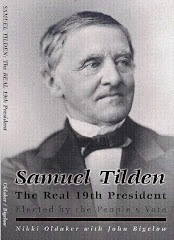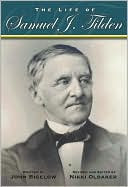Prior to the days of Email - people corresponded by snail mail. While digging for information I also came across this New York Times article dated August 12, 1886,"Dividing his Fortune" which actually describes part of Samuel Tilden's Will and how he left his money to build the New York Public Library. One of the things I admired most about Samuel Tilden was how he took care of the women in his family. He left them well established, as he did while alive...Here is also a link to Tilden family Genealogy.
What many do not know is Tilden't will was challenged by his Nephews in court and the New York Public Library almost didn't come to be. It was Samuel Tilden's best friend and confidant, John Bigelow who followed through to make sure his best friend's money was used to build the library.
Today, I wonder if people would still go out on a limb for a friend like Bigelow did for Tilden? Tilden never married so he had no direct heirs and it was John Bigelow he depended on to follow through for him, but did leave a "just in case" clause for Bigelow and other of his Estate Executives to use if the library was a no go. In later letters and as the letters unfold and are posted to my BLOG you will learn how Bigelow and Tilden became such close friends. They were, in my opinion, the "Odd Couple" with Bigelow being a devout Republican and Tilden a Democrat.
...Enjoy the history...Nikki Oldaker
The letters below are exchanges Pre Civil War between the Post Master General in DC and to Samuel Tilden's father, Elam Tilden who ran the Post office in New Lebanon NY.JOHN M. NILES - Postmaster General
TO ELAM TILDEN
"Washington, December 12, 1840.
"My Dear Sir,
I have your letter of the 7th inst., and thank you for the copy of the excellent speech of your son, which for the facts it contains, and sound, practical views, is worth more than all the speeches Daniel Webster has delivered on the currency question. The principal article in the Globe on prices and the wages of labor was from my pen, and I am pleased to learn that it met your approbation.
"That measures will be adopted before Congress closes to reorganize the Democratic party and settle on the course of action for the future is so manifestly proper, not to say indispensable, that I cannot doubt it will be attended to.
"Arrangements should be adopted for obtaining the facts from every country, town, and precinct in the Union, in relation to the foul frauds practised in the late elections. The' statements and certificates of these facts should be verified by oath when it could be done; and the whole ought to be published in a volume and put into the hands of every honest elector in the United States. This mass of information would be used by the Democratic papers as they might have occasion.
In his life he opened his mind on the subject of matrimony, a topic at that time of serious concern to her. See Bigelow's Life of Tilden, Vol. I., p. 80. Before the expiration of the year of which this letter bears date, she died. The brother when he wrote this letter was living with an aunt who kept a boarding-house at what was then the upper part of Broadway.
"Proprietor of the Hartford Times at the date and United States Senator from Connecticut.
"It is true, as you say, that the battle is not yet really begun; the true issues which divide the Democracy and the Federalists cannot be presented before the country except the latter are in power. They are then forced to come out with their measures and disclose their principles.
"There will be a glorious fight for the next four years, the result of which, I confidently believe, will be highly auspicious to the Democratic cause and the preservation of our popular institutions.
"I am, respectfully,
"Y'r ob't ser't,
"John M. Niles.
"E. Tilden, Esqr.,
"New Lebanon,"New York."
President Harrison died just one month after his inauguration, a casualty from which the Whig party never fully recovered. To the Congress which convened in extra session May 31, 1841, President Tyler intimated his desire that the members of that body should request a plan for a national bank from Mr. Ewing, then Secretary of the Treasury. In pursuance of the resolutions for this purpose adopted by both Houses, Mr. Ewing sent in a bill for the incorporation of the " Fiscal Bank of the United States," the essential features of which were framed in accordance with the President's suggestions. The bill passed Congress August 6, with a clause concerning branch banks differing from Mr. E wing's, which was vetoed by the President. The letter from Mr. Tilden which follows was a criticism of this bill, and probably had something to do with its untimely fate.
It does not appear from the copy to whom this letter was addressed by Mr. Tilden, but it was probably to Senator Wright.
Congress subsequently passed another bill intended to meet the objections of President Tyler. He concluded he could not approve it without inconsistency, and therefore vetoed that bill also, by which act he alienated the United States Bank wing of the Whig party to such an extent as to make many friends among the party of the opposition. It is to that phase of that absorbing bank issue at Washington that Mr. Tilden refers in the succeeding letter to Mr. Nelson J. Waterbury, then a very earnest, active, and intelligent Democratic politician, a few years Mr. Tilden's junior.
TO MR. NELSON J. WATERBURY
"New Lebanon, September 11, 1841."My Dear Waterbury,
On a flying visit of a few hours, which I made to the city some two weeks ago, I received your letter, but I was so busy in running about the country that I did not get a chance to answer it.
"You judge rightly as to my sympathy with your sentiments and action in regard to the veto. Our line of duty is plain. While we render to Tyler liberal credit for every good act he does, and sustain every right measure which he proposes, and defend him against the unjust and unconstitutional attacks of the Whigs, we cannot give his administration an unqualified support, or commit ourselves in favor of his re-election. So far, we agree with him only on the bank question—and there as to act of the veto, not as to its reasons, which are qualified and hesitating, and mingled with crudities and unsoundness; while as to the other questions—some of which are of great, if not equal, importance—we differ from him. If his course had been less objectionable we ought still to keep ourselves uncommitted as to the succession. We cannot enter into a bargain of office for measures. Whatever he does right, he must do spontaneously, and we will freely and heartily support, leaving the future to take care of itself.
"I never regarded Tyler as a man of very high capacity, and his public documents since he has been President have not increased my estimate of him. The last veto—which I have just read over—is better in matter and manner than the former, which was very objectionable in principle, but neither of them is creditable.
"I will confess that at first I was not without apprehensions that Tyler's course might be such as to conciliate a portion of our people, and weaken the efficiency of our action, while it would not be such as we could fully approve or safely support; and that he might construct a half-and half administration in which real and thorough democratic principles might suffer more than by open hostility. But my fears are diminished. Our people seem to be taking the right ground; and the enthusiasm at first excited will, I believe, settle at about the right point. A gentleman to whose opinion I very much defer thinks that Tyler is not a man to accumulate any political strength around him; and can in no event be dangerous.
"I do not know whether the Whigs will attempt to put in execution any of the desperate means which have been shadowed forth—such as a formal demand by the members of Congress for Tyler's resignation—a rejection of his nominations of official advisers in case the present cabinet shall retire — a systematic clamor to intimidate him to a surrender of his constitutional authorities. If they do, we must stand by him and his official rights to the uttermost.
"I intend to return to the city in about "three weeks. Meanwhile I shall be particularly glad to hear from you.
"I thank you for the paper you were so kind as to send me.
"Sincerely y'rs,
"S. J. Tilden."
Subscribe to:
Post Comments (Atom)



No comments:
Post a Comment
Post your comments: